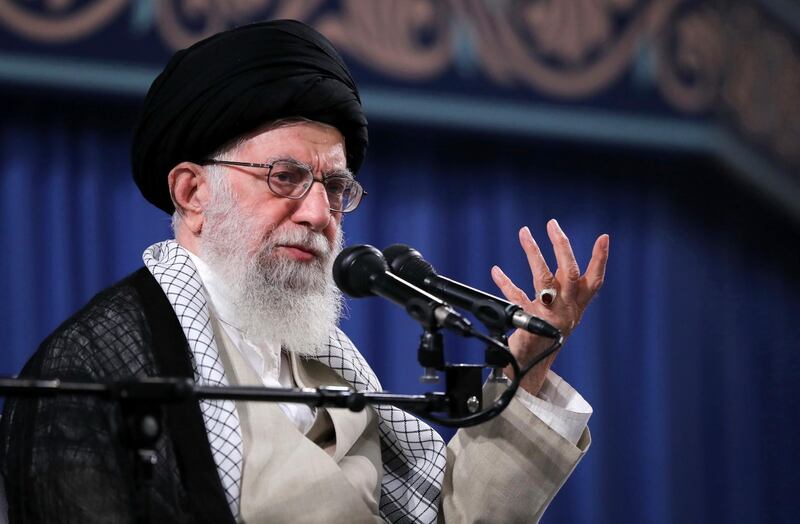Iranian Supreme Leader Ayatollah Ali Khamenei criticised the country’s president and foreign minister on Wednesday over the implementation of the landmark nuclear accord they negotiated with world powers in 2015.
These comments mark the first time the Islamic republic's most senior religious figure has pointedly called out President Hassan Rouhani and Foreign Minister Mohammad Javad Zarif by name.
In his remarks made at a Ramadan lecture for hardline students, Mr Khamenei blamed the two relatively modern politicians for the slow but sure unraveling of the deal. Hardliners have been ardent critics of the accord for bending to the West's demands.
Mr Khamenei, who wields final say on all state matters, had previously approved of the 2015 deal that lifted economic sanctions on Iran in exchange for restrictions on the country's uranium production.
Last year, US President Donald Trump withdrew from the deal that was brokered by then US secretary of state John Kerry under the Obama administration. Mr Trump called the agreement a “horrible one-sided deal that should have never, ever been made”.
The deal, which took more than two years to negotiate, is still in place. France, Germany, Britain, China, Russia, the EU and Iran are still signatories.
But since the White House deployed an aircraft carrier and B-52 bombers to the region earlier this year, Iran has pushed limits on the atomic accord.
Mr Khamenei's remarks come as tensions between Tehran and Washington are rapidly escalating as a result of President Trump's decision to beef up US military presence in the region and slash Iranian oil exports.
Trump administration officials said the sanctions are intended as punishment for Iran’s involvement in supporting proxy groups in Syria and Yemen.
Eight countries received waivers when sanctions were imposed in November 2018. Italy, Greece and Taiwan have halted their oil imports from Iran since receiving waivers which expired on May 2.
Turkey most recently halted its incoming supply. Initially they stood in defiance of US demands to stop Iranian oil imports.
Turkish Foreign Minister Mevlut Cavusoglu tweeted that the sanctions and termination of the waivers "will not serve regional peace and stability".
Analysts said Turkey is now supplementing the lost supply with oil from Iraq, Russia and Kazakhstan.
Iran reported it has bolstered its uranium developments in response to the oil sanctions, quadrupling production efforts. Although Iran is still enriching uranium under the 3.67 per cent limit set by the deal, the increased production will soon cause Iran to pass stockpile limitations.
Officials in Tehran have set a July 7 deadline for the remaining signatories to draw up new terms for the deal. If an agreement is not reached by then, Iran has threatened to enrich its uranium at levels closer to those needed for nuclear weapons.





